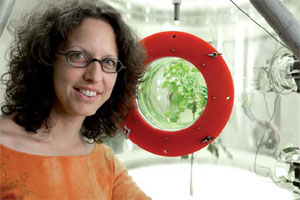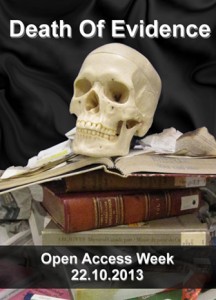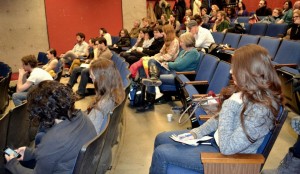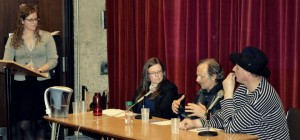The following appeared in the Friday, October 25, 2013 edition of Y-File:

A German atmospheric chemist will give this year’s Harold I. Schiff LectureThursday.
Astrid Kiendler-Scharr (left) will discuss how a warming climate may be inducing changes in emissions of organic aerosols from vegetation and whether the changes are reducing or amplifying climate change.
The title of her talk is Chemistry Climate Interactions: Biogenic Emissions and their Contribution to Secondary Organic Aerosol. She is giving the talk Oct. 31 at 2:30pm in 103 Life Science Building.
Here is a summary of her talk:
Atmospheric aerosols impact climate directly by scattering and absorbing solar radiation and indirectly by acting as ice and cloud condensation nuclei. Secondary organic aerosols (SOA) comprise an important component of atmospheric aerosols. Biogenic volatile organic compounds (BVOC) emitted by vegetation are a major source of SOA. It is known that BVOC emissions depend on climate, specifically on temperature and light. Therefore it is to be expected that a chemistry-climate interaction exists, in which climate change induces changes in BVOC emissions and thereby SOA formation, which feeds back to climate. The presentation details the state of the art knowledge on biogenic SOA and its climate relevance. The question of whether climate-induced changes in biogenic SOA formation may attenuate or amplify climate change is addressed based on experiments conducted in the Jülich Plant Atmosphere Chamber.
Kiendler-Scharr is a professor at the University of Cologne, a director at the Institute of Energy and Climate Research of the Research Center Juelich, and head of a group researching Stable Isotopes in Aerosol. She did her doctoral work on “Development and application of a novel aircraft borne ion trap mass spectrometer apparatus for the analysis of trace gases and ions: measurements in a laboratory, in the plume of jet engines and atmospheric trace gas measurements with aircrafts.” Her Habilitation in 2010 was on “Formation of secondary organic aerosols from biogenic emissions of volatile organic compounds.”
This is the 23rd Harold I. Schiff Lecture. The series is organized by the Centre for Atmospheric Chemistry and was established in honour of York’s founding dean of science. Schiff was known for developing techniques to measure trace constituents in the upper atmosphere and for interpreting the physics and chemistry of the stratosphere.



 not really using the talents of designers at a high level,” says Gould. She hopes to change that by helping students to become more aware of the sustainable design possibilities.
not really using the talents of designers at a high level,” says Gould. She hopes to change that by helping students to become more aware of the sustainable design possibilities. The park will test and showcase best practices, new methods and materials suited to the Canadian built environment.
The park will test and showcase best practices, new methods and materials suited to the Canadian built environment. walking experience on campus and how to tell stories in public space about the transformation that each construction project will bring about.
walking experience on campus and how to tell stories in public space about the transformation that each construction project will bring about. Kevin McKague
Kevin McKague Professor
Professor  Professor
Professor  Annette Louise Bickford (PhD ’02) of the Department of Sociology in the Faculty of Liberal Arts & Professional Studies (LA&PS) will receive the award in the Contract and Adjunct Faculty category. The nomination notes Bickford’s integration of student experiences into her teaching to increase understanding of complex theoretical debates. Those writing in support of the nomination speak of Bickford’s knowledge and her passion for sharing it, as well as her ability to encourage and challenge students to re-examine their views. Committee members noted not only her success as a hard-working, caring and respectful teacher, but also her commitment to continual improvement and contributions to the scholarship of teaching.
Annette Louise Bickford (PhD ’02) of the Department of Sociology in the Faculty of Liberal Arts & Professional Studies (LA&PS) will receive the award in the Contract and Adjunct Faculty category. The nomination notes Bickford’s integration of student experiences into her teaching to increase understanding of complex theoretical debates. Those writing in support of the nomination speak of Bickford’s knowledge and her passion for sharing it, as well as her ability to encourage and challenge students to re-examine their views. Committee members noted not only her success as a hard-working, caring and respectful teacher, but also her commitment to continual improvement and contributions to the scholarship of teaching. Janet Melo-Thaiss of the Departments of English and Humanities in LA&PS won the award in the Teaching Assistant category. Melo-Thaiss brings a good deal of experience as a course director at other universities to her recent work at York as a teaching assistant. She has an impressive breadth and versatility in her teaching and shares her experience when mentoring other teaching assistants. Committee members noted that students appreciate her ability to help them see and achieve their potential; ensuring that they learn, but making it fun at the same time.
Janet Melo-Thaiss of the Departments of English and Humanities in LA&PS won the award in the Teaching Assistant category. Melo-Thaiss brings a good deal of experience as a course director at other universities to her recent work at York as a teaching assistant. She has an impressive breadth and versatility in her teaching and shares her experience when mentoring other teaching assistants. Committee members noted that students appreciate her ability to help them see and achieve their potential; ensuring that they learn, but making it fun at the same time. The green roofs on the Petrie Science & Engineering Building and the Lassonde Building are a big part of sustainability initiatives underway at York University
The green roofs on the Petrie Science & Engineering Building and the Lassonde Building are a big part of sustainability initiatives underway at York University York University’s ZeroWaste initiative has been successful in diverting 65 per cent of the University’s waste from landfill
York University’s ZeroWaste initiative has been successful in diverting 65 per cent of the University’s waste from landfill The University community uses tri-bins to sort recycling
The University community uses tri-bins to sort recycling York U community members can
York U community members can now include the Canada’s Greenest Employer logo in their e-mail signatures. To do so, save the Canada’s Greenest Employers logo ( English left, French right) to your desktop and then in Lotus Notes, click “more” in the top navigation bar. Select “preferences”, click “signature” and place the computer cursor on the line immediately following your contact information. Click on the “T” icon at the end of your signature and choose “graphic”. Click again to select the image and then click “import”. Click “OK” to save and close the window.
now include the Canada’s Greenest Employer logo in their e-mail signatures. To do so, save the Canada’s Greenest Employers logo ( English left, French right) to your desktop and then in Lotus Notes, click “more” in the top navigation bar. Select “preferences”, click “signature” and place the computer cursor on the line immediately following your contact information. Click on the “T” icon at the end of your signature and choose “graphic”. Click again to select the image and then click “import”. Click “OK” to save and close the window. prime minister. Its closure was announced in the spring of 2012.
prime minister. Its closure was announced in the spring of 2012. country, and we are both proud and excited to receive it.”
country, and we are both proud and excited to receive it.” Embracing the Low-Carbon Economy”, “Reality Check: The State of Climate Progress in Canada”, “Canada’s Opportunity: Adopting Life Cycle Approaches for Sustainable Development”, and “Facing the Elements: Building Business Resilience in a Changing Climate”. All of these publications will be included in the data received by W3.
Embracing the Low-Carbon Economy”, “Reality Check: The State of Climate Progress in Canada”, “Canada’s Opportunity: Adopting Life Cycle Approaches for Sustainable Development”, and “Facing the Elements: Building Business Resilience in a Changing Climate”. All of these publications will be included in the data received by W3.
